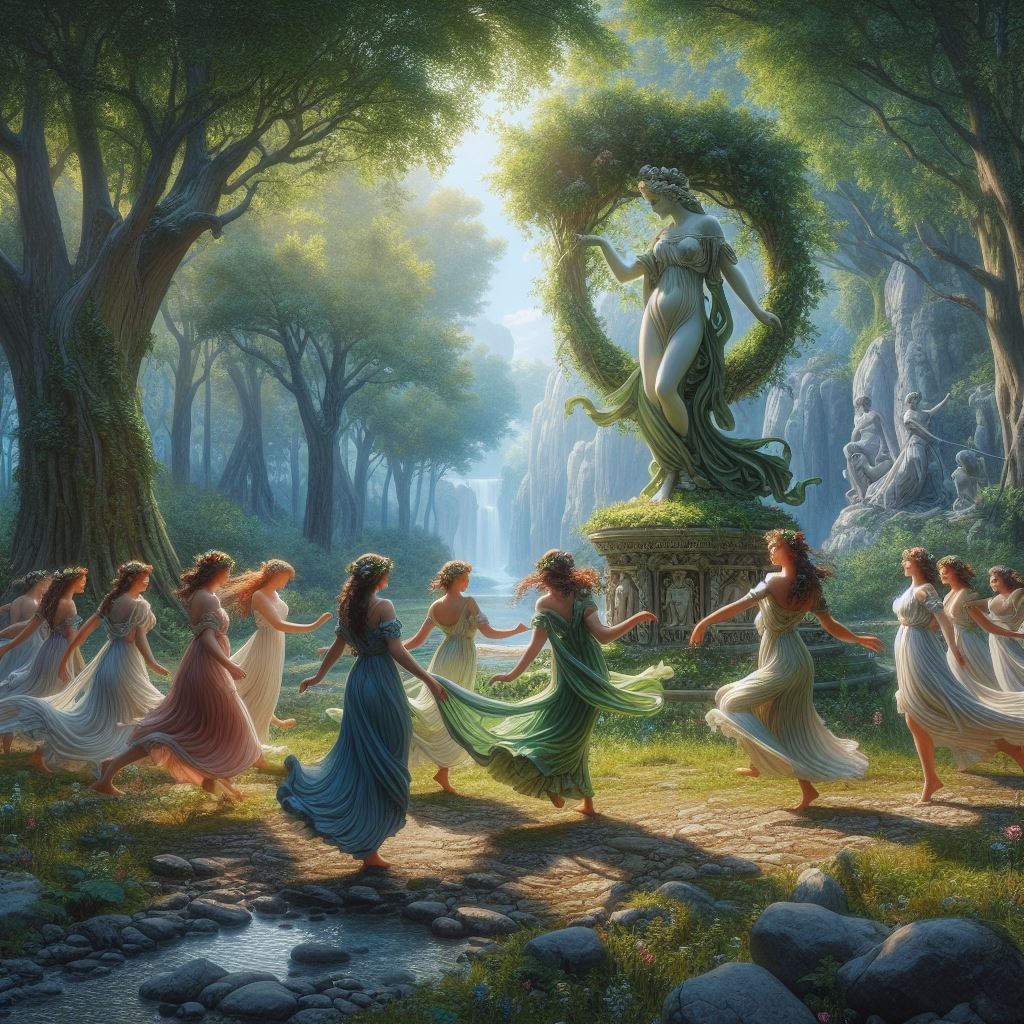LETTER FROM PSEUDOHESIOD TO CALLIAS
My Dearest Callias,
I hope this letter finds you well and thriving in all aspects of life. I have a request, but before delving into it, let me provide you with an update on the developments at my estate, which has undergone a transformation of considerable significance.

In times past, vast expanses of my estate were dedicated to the grazing of animals and the cultivation of traditional crops. However, the winds of change have swept through the fields, and a new era has dawned upon us. Inspired by the divine gifts of Dionysos, Demeter, and Pan, I have embraced a revolutionary method known as “precision fermentation.”
Just as the divine beings bestowed upon us the gifts of wine, bread, and yogurt respectively by fermenting the bounties of nature, so too can we now cultivate a myriad of essential substances through this precise alchemy. Fats and proteins, akin to those found in meats and milks, can be crafted in vats through the marvels of precision fermentation. This groundbreaking approach allows me to produce meats, cheeses, and even leather with unparalleled efficiency.

The true marvel lies in the conservation of resources and space. Whereas traditional methods consumed vast tracts of land for grazing and crop cultivation, precision fermentation requires only a fraction of these resources. The cultivated products match the quality and quantity of their predecessors but with a significantly reduced environmental footprint.
This shift towards sustainable practices has ushered in an era of harmony between Zeus, the mighty sky, and Gaia, the nurturing earth. No longer do they wage war; instead, a truce has been established. The vast lands once dominated by domestication are now liberated to return to their natural state, fostering biodiversity and the untamed beauty of wilderness.

This rewilding of spaces holds profound benefits for us, dear nephew. As creatures intimately connected to the natural world, these wild expanses are our ancestral home. The untamed landscapes inspire our spirits and serve as a soothing balm for our minds and emotions. The synergy between humanity and nature is restored, creating a haven of balance and coexistence.
While I have diversified into novel methods of food production through precision fermentation, there remains a portion of the land dedicated to the growth of plant-based sustenance. Here, I have embraced the principles of regenerative farming, a harmonious approach that seeks to mend the wounds inflicted upon the Earth by traditional agricultural practices. Among the foremost of these regenerative methods is the conscientious choice of perennial varieties over their annual counterparts.
The old ways, reliant on annual crops, resemble a battlefield where the plough is a weapon tearing into the soil each year. This perpetual disturbance disrupts the intricate life within the soil, diminishing its vitality. In contrast, perennial varieties offer a reprieve from this ceaseless struggle. By opting for plants with enduring root systems, the soil becomes a thriving ecosystem where life persists.
The roots of these perennial plants, undisturbed by the annual upheaval of ploughing, create a stable foundation for a flourishing soil community. Microorganisms, fungi, and a multitude of life forms find solace in this undisturbed haven, contributing to the fertility and resilience of the land. It is a testament to the ancient wisdom of Gaia, who designed her flora to endure and nurture the Earth’s tapestry.
This shift to perennial crops is a step towards balance and restoration, a return to the cyclical rhythms that sustain life. The land becomes a partner, not a battlefield, and the bounty reaped is a testament to the regenerative powers inherent in nature.
So, on my estate, a significant portion of the land has been allowed to return to its wild state. In this recalibration, the number of grazing animals has been carefully curated, just enough to harmonize with the growth of plant life and foster biodiversity.
The once-manicured meadows now surrender to nature’s reclamation. A mosaic of habitats emerges, with some areas evolving into vibrant meadows mixed with scrublands, others transforming into lush wetlands, and still others embracing the quiet majesty of a returning forest. This diverse landscape, curated by the rhythm of the wild, is now home to a rich tapestry of life.
Wandering amidst this symphony of habitats, a small herd of aurochs, wild boar, ponies untamed by human hands, deer, and elk traverse the land. The river, once a mere watercourse, is now inhabited by industrious beavers shaping their aquatic realm. This harmonious coexistence of flora and fauna brings about a resurgence of life, a resurgence that transcends the bounds of domestication.
Yet, in this return to the wild, the land remains a source of sustenance, albeit a different kind. No longer geared towards traditional agriculture or extensive grazing, it has found a new purpose. Nature, in all its untamed glory, has become an attraction for denizens of the city seeking respite. The rhythms of the wild draw them in, and the revenue generated from these nature enthusiasts sustains the estate, in addition to that gained from the cultivated foods.
Gone are the days of city folk yearning for a pastoral idyll as shepherds in Arcadian pastures. Instead, the desired ethos now aligns with the lives of hunter-gatherers, those who live in harmony with the untamed wild. Some seek the primal thrill of crafting and wielding the bow, while others immerse themselves in the ancient art of tracking.
For those yearning to reconnect with primal roots, grass huts provide shelter, and the nights are alive with the trance dance around the fire. The nocturnal reverie transcends time, echoing the ancient beats of existence. And yet, many simply come to walk, to breathe, to be enveloped in the embrace of the wild.

As I lay bare the transformative journey of my estate, I am reminded of the profound impact poets have had on shaping perceptions and visions. The idyllic imagery of shepherds tending their flocks, a staple in the poetic tapestry of old, has cast an enchanting aura around pastoral scenes. However, the changing tide necessitates a new vision, a poetic embrace of the evolving landscape.
In this age of vat-cultivated sustenance and regenerative farming combined with the re-wilding of large areas, there exists a faction resistant to change, unable to envision the healing touch these methods extend to the Earth. To them, a re-wilded expanse may appear as untidy, ruined, bereft of worth. Herein lies the crux of my request, dear Callias.
The world hungers for poets who can weave beauty around the untamed wilderness, crafting verses that celebrate the return of nature to its primal state. We need idylls that paint the arcadian hunter-gatherer as a custodian of harmony, georgics that extol the virtues of regenerative farming, and eclogues that sing the praises of cultivarian rewilders.
Might you, Callias, with your pen dipped in the ink of inspiration, conjure these poetic realms into existence? Your words, my dearest friend, have the power to spark a new understanding, to cast light on the beauty that emerges when the land is allowed to dance to its own untamed rhythm. A vision painted in your poetic hues could be the beacon guiding minds to embrace the wild as a realm of wonder and renewal.
The shift towards a new vision requires more than a mere deviation from established norms—it necessitates a delicate dance between innovation and tradition. As I ponder the prospects of cultivating a poetic realm that encapsulates the spirit of re-wilded landscapes, the echoes of past traditions resonate within me.
Tradition, as the timeless custodian of beauty, weaves the threads of the past into the fabric of the present. It is a celestial choir of voices that spans generations, creating an enchanting melody that transcends time. To break with this tradition would be to sever our connection with the very source of beauty. Thus, my dear Callias, I entreat you to embark on this poetic journey with the understanding that our verses must not only be a reflection of innovation but also a seamless continuation of the age-old traditions that have shaped our cultural tapestry.
In contemplating the challenge ahead, I find solace in the belief that your poetic prowess will navigate the delicate balance between the allure of the new and the embrace of tradition. The task is formidable, but I have faith in your ability to craft verses that resonate with the celestial choir of our ancestors, creating a harmonious symphony that bridges the ancient echoes with the melodies of a reimagined future, where the wild and the cultivated dance together in a timeless embrace. Your poetic quill, I believe, can weave a tapestry that honors tradition while embracing the transformative rhythms of the land’s renewal.
May the Muses guide your pen on this venture, my dear Callias.
Ever in anticipation,
Pseudohesiod
REPLY FROM CALLIAS:
My Dearest Pseudohesiod,
I hope this letter finds you in good spirits and health. Your missive, filled with the wisdom of your endeavours on the estate, has reached me, and I am heartened to hear of the positive transformations taking place. The harmonious union between nature and humanity, forged through regenerative farming and the return of land to its wild roots, enabled by new advances in food fermentation, is a vision that speaks to the soul and echoes the celestial order.

Your words have sparked a fire within me, urging me to contemplate the poetic threads that can weave this vision into the tapestry of our shared traditions. As you wisely noted, the resonance with tradition is the source of true beauty. It is within this framework that I took up the challenge you presented.
I eagerly await your thoughts on these first two humble attempts, and I am prepared to refine them further if needed. Your guidance and insight have been invaluable in shaping this poetic response. May the celestial choir of our ancestors chime in with these verses. I give you them both here below, starting with my first Hunter’s Idyll:

Within the ancient ilex shade,
Euphronios sat with bow half-made,
Beside him Kalon took a seat,
To watch his friend the bow complete,
“Dear friend,” Euphronios proclaimed,
“Sing me a song, worthy of fame,
And if I find your singing fair,
This bow, when made, with you I’ll share.”
So Kalon, with his eyes a-glow,
Begins a tune both sweet and slow:
“Between the oaks the wood nymphs dance,
So lightly trips the line along,
Come here ye Muses of the woods,
And sing the rustic woodland song.

In twilight’s gloam on oaken boughs,
The honey-throated nightbirds throng.
Come here, ye Muses of the woods,
And sing the rustic woodland song.
Of city crowds I’ve had my fill
In woodland pastures I belong
Come here, ye Muses of the woods,
And sing the rustic woodland song.
The centaurs thunder through the vales
Where Arcady’s old oaks stand strong,
Come here, ye Muses of the woods,
And sing the rustic woodland song.”
Euphronios, happy, nods his head,
“The bow is yours,” he warmly said.
“For showing nymphs to Fancy’s eyes,
Your well-made song deserves the prize.”
And now, dear uncle, I give you my first Cultivarian Rewilder’s Eclogue:
If you will sing the tale of Arcas, then you’ll get from me, 9th
In Arcady within the shade of ancient ilex trees,
The air is lulled by cricket song and hum of honey bees,
Cicadas scratch their mesmerising rythms ‘cross the land,
As Euphranor and Niketas, two hunters, with skilled hands,
Are tanning hides, lab-cultured but as good as those you’d find,
Upon the back of noble stag and agile, darting hind,
Now Euphranor to Niketas, a gleam within his eyes,
Says “Listen, friend, there is for you, the promise of a prize,
Would, when the hunt began, become the first nymph to advance.

A farm-free cheese, lab-cultured, but as toothsome as can be.”
So while the two continue at their work of tanning skins,
Distraction is provided as the ancient song begins:
“Within the mountain glades where pines and ilex trees stand tall,
Callisto, nymph of Artemis, paid heed to nature’s call,
Companion to the huntress goddess, She of silver bow,
Who chases through the woods of oak by light of lunar glow.
Oft’ there beneath the shadows of the sacred, ancient trees,
Within the realm of Artemis wherein the swift deer flees.
The nymph, agile and graceful in the sylvan mystery dance,
But now the gaze of Zeus beheld the verdant woodland glade,
He saw the sweet Callisto with her beauty all displayed.
A strong desire was kindled in the king of all the sky,
Enraptured by the nymph whose presence made the forest sigh.
Then so he could aproach unseen he used his magic art,
Disguised himself as Artemis and well he played the part.
Approached, seduced, entwined in secret one clandestine night,
The nymph consenting to the god with scarcely any fight.
Into the heart of Artemis a wrath divine did creep,
Her nymphs a vow of chastity had sworn to always keep.
The insight of the goddess saw into this woodland place,
And so she came to know about the pair’s secret embrace,
So Zeus, in lofty mercy or perhaps more cunning guile,
Now cloaked the nymph in fur, and fearsome snout replaced soft smile,
A bear’s form thus assumed, the young Callisto was disgiused,
To keep her safe from Artemis, who now the nymph despised.
In later years her son Arcas was hunting in a glade,
And then he met this bear beneath a lofty laurrel’s shade,
In self-defense, the both of them made ready for the fray,
Not knowing of the cruel trick the fates on them had played,

Again ’twas Zeus who used his arts, to make the son a bear,
Then lifted both, the son and mother, high into the air,
Now Usra Major next to Ursa Minor circles round,
By means of them within the dark the hunter’s way is found.”
The song is done, which does the listener Euphranor well-please
Inspiring him to sing these praises as he gives the cheese:
“As nightingale in sweet lament surpasses common bird,
So does your voice outshine the song of any I have heard,
Not Lykomedes swift of foot nor Kyros keen of sight,
Could raise the rustic songster’s art to such a lofty height,
For as the hunter’s arrow flies straight to the quarry’s heart,
Your singing flies into the hearts of all who hear your art.”

I eagerly await your thoughts on these first humble attempts, and I am prepared to refine them further if needed. Your guidance and insight have been invaluable in shaping this poetic response. May the celestial choir of our ancestors deign to chime in harmony with these verses.
With warm regards,
Callias

